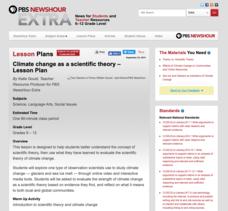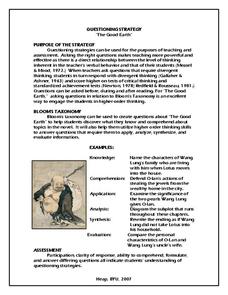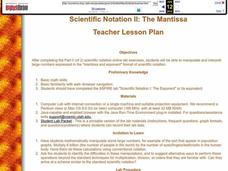PBS
Climate Change as a Scientific Theory
Get your class thinking about climate change as a scientific theory. Guided by a handout, emerging earth scientists read articles and take notes about glaciers and sea ice. To conclude, they write an evaluation of the evidence for...
Curated OER
Speak: Questioning Strategy - ReQuest Strategy
The best way to analyze a piece of literature is to ask questions about the characters, plot, and theme. Encourage your learners to stump the teacher with the most difficult questions they can create using Bloom's Taxonomy and various...
Curated OER
Two Beets Or Not Two Beets—What Is Your Question?
Students use the scientific method to test an idea regarding the structures of a plant as it supports the biological evidence for life. In this growing roots instructional activity, students use organizing sheets to record their...
Novelinks
The Good Earth: Questioning Strategy
Readers use Bloom's Taxonomy to create multi-level questions about Pearl Buck's The Good Earth.
Curated OER
Phineas Gage: Questioning Strategy
Focus on chapter two of Phineas Gage: A Gruesome but True Story About Brain Science with a questioning activity. After teaching and modeling several types of questions, learners work with partners and then independently to answer and...
Curated OER
My Antonia: Bloom’s Taxonomy Questions
How well do your pupils know My Antonia by Willa Cather? Take some time to create questions about the text. After examining a teacher model, individuals write questions that match each level of Bloom's Taxonomy and draft answers to these...
Minnesota Literacy Council
Scientific Method
Here is a resource with a descriptive approach to explaining the scientific method. It's simple, but effective for both introduction and reinforcement of this concept.
Curated OER
Science Questions
Explore the concept of generating questions. Your curious learners choose a scientific question from a bowl and, as they listen to an article being read, they use that question starter to come up with their own questions. Then, they have...
Willow Tree
Scientific Notation
Numbers that are very large or very small are difficult to express in standard notation. Pupils learn how to convert between standard and scientific notation. They also multiply and divide the numbers in scientific notation.
Howard Hughes Medical Institute
Lesson 3: Scientific Inquiry with WildCam Gorongosa
When biologists installed cameras in Gorongosa National Park, they ended up viewing a lot more than the lions they were trying to help! Young ecologists observe one of Africa's most beautiful savanna regions with interactive trail camera...
Novelinks
The Crucible: Questioning Strategies Bloom's Taxonomy
Enrich your unit on Arthur Miller's The Crucible with a list of reading questions based on Bloom's Taxonomy. Kids answer questions and provide context for the knowledge, comprehension, application, analysis, synthesis, and evaluation...
Curated OER
Scientific Notation II: The Mantissa
Practice converting a conventional number into scientific notation, and vice-versa. Using an applet, they perform the operations of multiplication and division on numbers expressed in scientific notation.
Curated OER
Regarding the Fountain: Questioning Strategy—Cubing
Look deeper into the text with a reading strategy based on asking critical thinking questions. While reading Reading the Fountain by Kate Klise, learners think of questions that help them describe, compare, associate, analyze, apply, and...
Curated OER
Out of the Dust: Questioning Strategies
Bloom's Taxonomy is a great way to address the many levels of comprehension. With explanations and examples of each level, you can create questions that focus on knowledge, comprehension, application, analysis, synthesis, and evaluation.
Curated OER
Running Out Of Time: Bloom’s Taxonomy Mixed with QAR
Dig into chapter 19 of Running Out of Time with questions covering each level of Bloom's Taxonomy. Learners read the text, respond to the questions in paragraph form, and then discuss the answers as a class.
Curated OER
Paradise Lost: Bloom’s Taxonomy of Thinking Processes
Chapter II of John Milton's Paradise Lost provides the text for a series of comprehension questions crafted using Bloom's Taxonomy.
West Contra Costa Unified School District
Scientific Method Mania
Horrible science puns only happen periodically, but the scientific method is forever. Young scientists observe two presentations on the scientific method, complete independent practice worksheets, and integrate their knowledge through a...
Brigham Young University
A River Runs Through It: Blooms Taxonomy
Designed for teachers who use Norman Maclean's autobiographical A River Runs Through It, this one-page resource offers discussion question structured using Bloom's Taxonomy.
Novelinks
Zach’s Lie: Questioning Strategy – Cubing
Your class won't be a bunch of squares from using this well-rounded activity! Instead, they'll be expressing thoughtful questions using the cubing strategy. The class brainstorms questions of increasing rigor about Zach's Lie in the...
Curated OER
Maus: Cubing Questioning Strategy
Maus is the text for a postreading activity that has class members using a cubing strategy to analyze, in depth, topics (racism, past and present, forgetting/remembering the Holocaust, representing the Holocaust) associated with Art...
Curated OER
The Book Thief: Discussion Questions
Expand your study of The Book Thief by Markus Zusak with a question for each level of Bloom's Taxonomy. These questions focus on part four of the novel; each is paired with at least one quote from the text for context and teacher reference.
Novelinks
The Little Prince: Blooms’ Taxonomy Questions
Question what you read with a lesson based on Bloom's Taxonomy. As kids read The Little Prince by Antoine de Saint-Exupéry, they formulate questions with cues from a graphic organizer, and answer them to work on critical thinking skills.
EngageNY
Efficacy of Scientific Notation
How many times could California fit into the entire United States? Pupils use scientific notation to find the answer to that question in the 12th installment of 15 lessons. It asks scholars to write numbers in scientific notation and...
Curated OER
Forming Open-Ended Questions
Help readers learn to create their own open-ended questions for any text you are working with. Using Bloom's Taxonomy, learners begin on the lower levels and work their way up to form questions that focus on synthesis instead of simple...

























